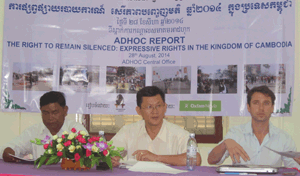Keynote addressed by Mr. Thun Saray
CHRAC Chairman and President of ADHOC
at Workshop for Civil Party and Defence Lawyers of the ECCC
“Brainstorming of Lessons Learnt at the ECCC to be transferred to national court”
On 16 December 2010, at Cambodiana Hotel, PHNOM PENH.
————————
Dear distinguished guests, ladies and gentlemen, particularly national civil party and defence lawyers of the Extraordinary Chambers in the Courts of Cambodia (ECCC).
Today, I have a very great honor to join this workshop together with you. On behalf of the Cambodian Human Rights Action Committee (CHRAC), I would like first to take this opportunity to welcome you as lawyers working actively at the ECCC, and to express my sincere thanks also to the co-organizer, the Cambodia Office of the High Commissioner for Human Rights (OHCHR-Cambodia).
The workshop today is organized aiming at bringing together independent lawyers working at the ECCC to discuss what kind of positive experiences have gained at the court and how these experiences might influence the conduct of the trials in our current national court system. This workshop is just the first of a series of workshops which is participated by only the civil party and defence lawyers currently practicing at the ECCC. Several other thematic focuses will be organized next year and provided for ECCC legal professionals including judges, prosecutors and lawyers. By drawing the best lessons learnt at the ECCC, or in other words, “knowledge transfer”, particularly on the legal part, it will help to fill in the gaps identified at the national court’s practices and the application of laws.
The establishment of the ECCC and bringing to trial senior leaders of the Democratic Kampuchea who were most responsible brought also new chances and challenges to the national judicial system. The ECCC experiences can have and will have positive impact in promoting and protecting the rule of law and moreover strengthening the independence and capacity of the judiciary.
Some of the positive effects from our observations should be noted here and can be key points for the following discussion:
· Civil Parties Participations: It is meaningful for justice; the impact of Civil Party Participation is model for future International Criminal Courts, and also the mechanism for changing some attitudes of judges from Common Law System who never considered the importance for victim participation. It’s become the best practice to the Civil Courts in Cambodia for a model to refer the victims’ participation.
· Investigation and Case file documented into the Computer Data System: It’s roughly need for Domestic Court in Cambodia to be considered.
· Trial Processing is well debate with schedule from each party in the Trials.
· The Verdict of the Case 001: it also gives legal reasoning for model
· The Lawyer from each party had strong arguments to make justice due to the Court process.
Accordingly, the Judiciary has an obligation to dispense justice in accordance with the Law, standards of Justice, fairness and due to process of law. We strongly appeal to the mission of the Khmer Rouge Tribunal that they should not leave behind a legacy of impunity but rather justice. Even though there will be challenges in the future from political intimidation to insufficient funds.
It’s is very important for the civil society together with other relevant institutions, particularly the OHCHR-Cambodia, to start focusing now on the “positive lasting legacies” for the national court system. By doing so, we hope that many best lessons learnt from the ECCC can be positively transferred to the national courts and also helps in the current legal and judicial reform efforts made by the Cambodian Government. For this to happen, we need proper and adequate plans for the legacy of this internationalized tribunal at the early stage as possible and with consultation and active participation of key stakeholders.
Therefore, we should work together like in many other fields in order to enable fruitful discussions and dialogues on these legacy issues among key stakeholders, including the ECCC Legacy Working Group that was created last year, the Government’s Legal and Judicial Reform Council, ECCC legal professionals such as judges, prosecutors, lawyers, legal officers, practicing legal aid NGOs and their lawyers, and donors.
With your active participation, I strongly hope that our discussion today can achieve the planned objectives and will contribute to a longer-process for the ECCC legacy that can potentially impact our national legal and judicial reforms.
Lastly, on behalf of the co-organizers, CHRAC and OHCHR, I appreciate your participation and contribution, and I look forward to hearing a fruitful debate.
Thank you very much.

